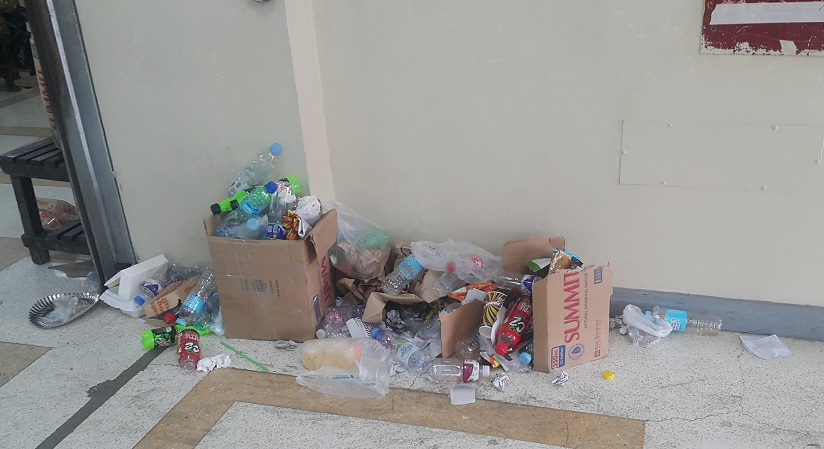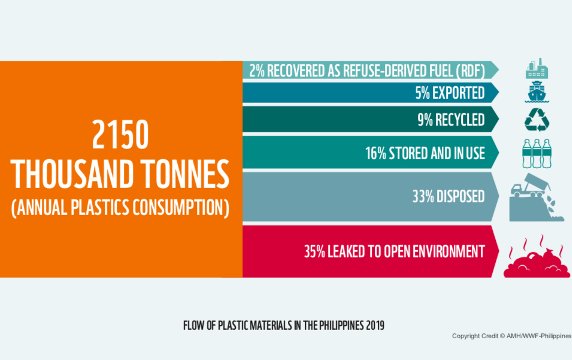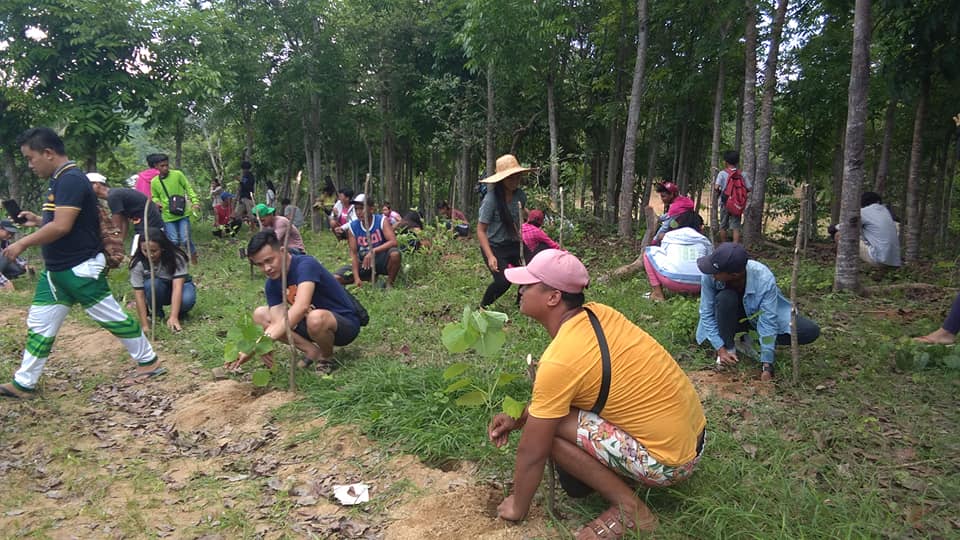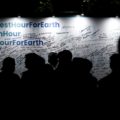From wrapping paper to dinnerware, think eco-friendly this Christmas season and avoid wasteful consumption.
It is around the holidays that the country generates the biggest volume of garbage, including plastic, says Environment and Natural Resources Secretary Roy Cimatu, so consumers are reminded to reuse and recycle and choose materials that do not harm the environment.
He said Metro Manila alone generated over 66,000 cubic meters of garbage in the first six months of 2019, exceeding the full-year forecast of 58,112 cubic meters.

Garbage spilling over boxes. Photo by Klaire Ting.
“Because of this, we really need to cut back on our consumption and waste, and get back to basics to make life easier and to help the environment in the process,” Cimatu added.
He recommended the use of eco-friendly materials for wrapping paper and gift bags, such as those made from bamboo, abaca and other alternatives that can be reused or recycled. “The best way to reduce wrapping waste is to wrap a gift in something that’s part of the gift like a reusable tote bag,” he said.
Cimatu also advised people to use washable dinnerware and cutlery instead of paper plates and plastic cups, spoons and forks.
An increase in plastic consumption is indeed expected around the holidays, according to Beau Baconguis, plastics campaigner of the Asia-Pacific Office of the Global Alliance for Incinerator Alternatives (GAIA).
“First, there’s packaging from the presents that they buy. And then, the gift wrapping that comes with it. There’s really much more consumption, more than during other months. There will be more wasting happening,” she said in an interview.
When buying presents, Baconguis suggests that shoppers put small packages in a canvas bag,
which is more environment-friendly because it is made from naturally produced material.
“As much as possible, we’d like to stay away from the plastic packaging whether biodegradable or non-biodegradable,” she said.
“Paper bags are a false solution because you only substitute the material, but there are big environmental issues related to it, like deforestation,” the environmentalist said.
Huge volumes of daily plastic waste
Filipinos use 48 million plastic shopping bags and 45 million thin film or so-called plastic labo bags every day, according to a 2019 report by GAIA. Over three million diapers are discarded daily, it said.
“The group contends single-use disposable plastic is the greatest obstacle to sound waste and resource management, and is calling on governments and manufacturers to regulate, and stop producing, single-use plastics,” the GAIA report said.
Earlier this month, Cimatu said a nationwide ban on single-use plastics will be enforced soon. In addition to the ban, the government will also implement a plastic recycling program.
The Philippines, he added, ranked as the third biggest source of ocean plastic pollution with an “estimated 2.7 million metric tons of plastic waste.”
In Quezon City, an ordinance prohibiting single-use plastic and other disposable materials has been approved and is expected to take effect early 2020. The ordinance (SP-2876) will cover hotels and restaurants around the city.
City Mayor Joy Belmonte said the ban will benefit the environment as “these avoidable wastes are known to add to the city’s huge waste production and to littering and flooding problems.”
An invisible problem
Baconguis warns that some plastic bags may be labelled biodegradable, but are not.
“You need industrial composting systems (to break down plastic), and that does not exist right now. (The plastic) just breaks up into small pieces and become micro-plastics. Then, we have more problems because we won’t be able to collect micro-plastics.”
Micro-plastics are a result of the mechanical breakdown of plastic bags when exposed to the environment, but they do not completely turn into soil, water or carbon dioxide. Plastic just breaks down into smaller particles.
“It’s not visible to the naked eye, so now, it gets into your water, food, into smaller animals, and it goes up into the food chain,” said Baconguis.
A 2019 report by the Center for International Environmental Law (CIEL), an advocacy group, points out that humans are exposed to a large variety of micro-plastics through inhalation, ingestion, and direct skin contact, all along the plastic life cycle.
“The individual chemicals are carcinogenic or mutagenic. They are also hormone disruptors, so we know that by just looking at chemical additives, these are problematic,” Baconguis added.
Among these harmful additives are paints, dyes, and flame retardants.
“These are chemicals that are extremely toxic, even in very minute amounts,” the GAIA campaigner said. “They interfere with your immune system. Some of them can cause cancer.”
“But in terms of micro-plastics, there are still very few studies that look at how they are and how they affect the human body if ingested,” she added.
Regulating single-use plastics
“We are also asking Congress to speed up the passage of a national law to reduce the use of single-use packaging. There are bills filed in the Senate and the House but there hasn’t been much progress,” Baconguis explained.
Senator Francisco ‘Kiko’ Pangilinan filed last July Senate Bill 40, Single-Use Plastics Regulation and Management Act of 2019, which aims to phase out single-use plastic products by prohibiting their importation, manufacture, and use in food establishments, stores, markets and retailers.
In the House, Bagong Henerasyon partylist representative Bernadette Herrera-Dy filed Bill 3338 banning the use of single-use plastic products to help curb plastic pollution.
Both bills are pending in their respective committees and are now expected to be given priority after President Rodrigo Duterte expressed support for a nationwide ban on single-use plastics during a Cabinet meeting last month.
To spread awareness on the effects of plastics and the importance of the ban, GAIA’s Baconguis said, “we will do a full-court press on plastics next year.”








